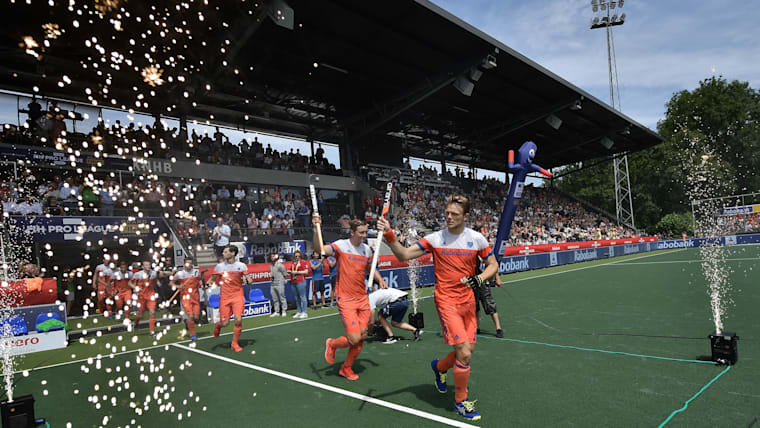News for 06 November 2020
All the news for Friday 6 November 2020
FIH Hockey Pro League matches postponed
Lausanne, Switzerland: With the travel constraints governed by the regulations in place in Germany, Belgium and China due to the COVID-19 global health pandemic, the International Hockey Federation (FIH), on request of the travelling teams involved, has decided to postpone the following FIH Hockey Pro League matches:
- Great Britain vs Germany (initially planned on 14 and 15 November 2020)
- China vs Belgium (initially planned on 23 and 24 January 2021)
FIH will keep on monitoring the evolution of the global health situation closely and define, together with the teams concerned and its broadcast partners, new dates for these matches when it will be possible to do so.
FIH CEO Thierry Weil said: “While it’s always a pity to have to take such decisions, we fully understand the situation and this is the most appropriate course of action to date. We do hope that the global health situation will improve soon and our thoughts are with all those who are affected at the moment. We’re looking forward to enjoying international hockey matches next year again!”
Season 2 of the FIH Hockey Pro League – the annual global League involving the world’s best international teams, both men and women – started in January 2020 and has been extended until May 2021 because of the pandemic.
Keep up to date with all the latest news on the FIH Hockey Pro League via the Watch.Hockey app, event website and through FIH social media channels - Facebook, Instagram and Twitter.
#FIHProLeague
#HockeyInvites
#PlayHockeyStayHealthy
Official FIH Pro League Site
Upcoming Home Games Against Germany in FIH Hockey Pro League Postponed
Hannah Martin takes on Germany in the FIH Hockey Pro League
The International Hockey Federation (FIH) have today announced that this month’s FIH Hockey Pro League games between Great Britain and Germany have been postponed.
Britain’s men and women were due to face their German counterparts across the weekend of 14 and 15 November behind closed doors at Bisham Abbey, but the FIH has agreed to postpone the matches at the request of the visitors.
Great Britain Hockey understands and respects the decision, and ourselves, the FIH and Germany will look to set new dates in due course.
Great Britain’s teams have just returned from the Netherlands and Belgium, where they played their first international matches since the early part of this year. With the postponement of the Germany matches, the teams’ next scheduled games are at Lee Valley Hockey and Tennis Centre on Queen Elizabeth Olympic Park across three consecutive weekends in May 2021. Tickets for those games in London are on sale now with the cheapest prices available in the Hockey Family window, plus a refund guarantee.
Great Britain Hockey media release
Rising COVID-19 cases in Europe put brakes on FIH Pro League
Having resumed the league after a prolonged break in September, the governing body has been forced to postpone the event to next year.
By Naveen Peter
With the rising number of COVID-19 cases across Europe forcing various nations to impose travel restrictions, the International Hockey Federation (FIH), on Thursday, has put on hold two upcoming FIH Pro League fixtures.
The matches affected are Great Britain vs Germany (November 14 and 15) and China vs Belgium scheduled on January 23 and 24.
“FIH will keep on monitoring the evolution of the global health situation closely and define, together with the teams concerned and its broadcast partners, new dates for these matches when it will be possible to do so,” the FIH said in a statement.
Brought to a halt due to the pandemic, the 2020 edition of the FIH Pro League resumed in September with the European teams engaging in their fixtures over the past month.
While FIH could complete most of the scheduled matches, Great Britain vs Germany is the only match that has been impacted by a fresh COVID wave in Europe.
“While it’s always a pity to have to take such decisions, we fully understand the situation and this is the most appropriate course of action to date,” FIH CEO Thierry Weil said.
"We do hope that the global health situation will improve soon and our thoughts are with all those who are affected at the moment. We’re looking forward to enjoying international hockey matches next year again!”
The Indian men’s hockey team, which is competing in the FIH Pro League for the first time, is expected to be seen in action with the competition resumes in the new year.
The Manpreet Singh-led side had a fine start to its debut campaign with wins over Belgium and the Netherlands before the pandemic struck.
Olympic Channel
Light flickers out on 2020 international hockey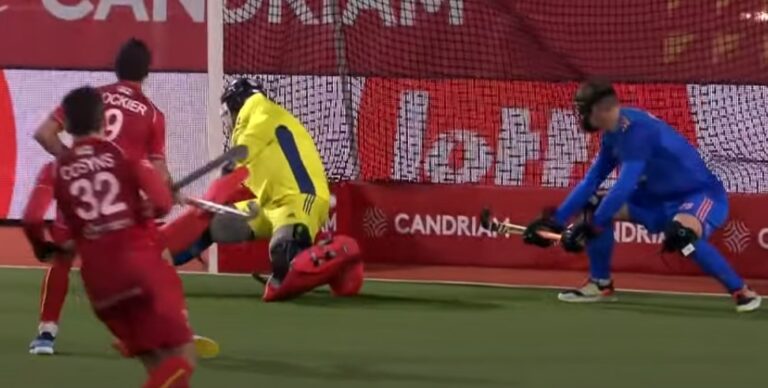
At least we have the 4-4 to remember. “I think we provided a good show for the people at home,” said Floren Van Aubel as world champions Belgium won the extra bonus point against Holland in a typically riproaring European heavyweight encounter.
Several hours later it was confirmed that the rest of this year’s Pro League matches had been cancelled, bringing international hockey to an end in the pandemic-ridden year that is 2020.
The next scheduled internationals are set for February after the FIH announced that Great Britain’s games against Germany were postponed. GB men and women were due to face Germany behind closed doors at Bisham Abbey, but the FIH postponed the matches at the request of the visitors, with new dates to be set in due course.
It means that Wednesday’s 4-4 normal time thriller in Brussels is the last international hockey we’ll likely see in 2020. And with domestic leagues across Europe currently suspended, there is little hope for much more in the coming weeks.
In a see-saw encounter between the top two men’s Pro League sides, Alexander Hendrickz opened and closed the scoring for Belgium. Holland had been 3-2 to the good and relied on Billy Bakker, who broke free late on, to take the game to a shoot-out, which the hosts won 3-1.
The Dutch team then left in their own cars to drive back home to respect the national curfew. Let’s hope the curtains can be drawn back fully in 2021.
SIGN UP for The Hockey Paper’s returning newsletter: Promotions, exclusives and our best coverage
The Hockey Paper
Belgium and the Netherlands close out Pro League year with eight-goal cracker
The FIH Pro League’s short autumn series ended with a bang as men’s league leaders Belgium nicked the bonus point against the Netherlands after a thrilling contest finished 4-4 at the Royal Uccle Sports Complex in Brussels.
In a match that saw action swinging rapidly from one end of the field to the other from start to finish, it was the Red Lions – the reigning World and European champions – who took the lead when Alexander Hendrickx scored a trademark penalty corner before open play strikes from Jeroen Hertzberger and Thierry Brinkman turned the match around to put the Dutch into a 2-1 lead at the quarter-time break.
The two sides traded blows in the third quarter, with Maxime Plennevaux’s stunning overhead smash levelling the scores for Belgium before Jip Janssen immediately restored the Dutch lead from a penalty corner situation.
The Red Lions wrestled the match back in their favour early in the fourth quarter as goals from Florent Van Aubel and a second for Hendrickx established a 4-3 lead. However, Belgium conceded within a minute of the re-start for a third time when Billy Bakker raced through to fire home, sending the match to a shoot-out.
Belgian goalkeeper Loic Van Doren was the hero in the one-on-ones, being beaten just once as the Red Lions triumphed 3-1 to seal a bonus point, extending their advantage over the Netherlands at the top of the standings from seven to eight points, having played two games more than the Dutchmen.
“Battles against the Netherlands are always great”, said Floren Van Aubel, who was named Player of the Match. “We have a nice history together and we knew it was going to be very tough. I think we provided a good show for the people at home.”
Netherlands captain Billy Bakker said: “It was a tough game for us. We were in front, not dominating the game but we were playing very well in these circumstances. They scored two good goals and we are happy that we could eventually make it 4-4. It was a pity that we lost on shoot-outs, but that’s okay.”
The contest between the Netherlands and Belgium was a personal milestone match for Dutch umpire Coen van Bunge, who took charge of his 100th senior international.
Earlier in the day, the Netherlands women extended their advantage at the top of the standings with a comprehensive 4-0 triumph over Belgium’s Red Panthers.
The reigning World, European and FIH Hockey Pro League title holders were in dominant form, taking a 1-0 lead three minutes ahead of half time through Lidewij Welten before Frederique Matla, Lauren Stam and Margot van Geffen – who hit a stunning strike into the roof of the Belgian goal – netted third quarter goals to all three points against the home favourites.
The Oranje are now six points clear of second placed Argentina at the top of the table, with both teams having played eight matches to date.
“We made it 4-0, but we wanted to score more”, said van Geffen, who was named Player of the Match. “We had opportunities to score more, but it was a good game.”
On Thursday morning, however, news came through that upcoming games have been pushed back. With the travel constraints governed by the regulations in place in Germany, Belgium and China due to the COVID-19 global health pandemic, the FIH, on request of the travelling teams involved, has decided to postpone GB against Germany next week and China’s games against Belgium in January.
Euro Hockey League media release
100th international match Coen van Bunge: ‘wants to become a record international’
Seventeen years after Peter Elders whistled his hundredth international match, Coen van Bunge will receive the Golden Whistle on Wednesday at the FIH Pro League match between Belgium and the Netherlands . On the eve of that game, we watch his first, best, worst and most memorable match with the Dutch arbiter. “The images of my worst match still hurt too much to look back.”
First international match: 2008 Belgium – Australia, Beerschot
Coen van Bunge: ‘I was 27 years old at the time. Certainly by Dutch standards it was a young age to make your international debut. It was a friendly international match, but both teams were on edge in preparation for the Olympic Games in Beijing. The game was played at Beerschot. Full house. I whistled with Roel van Eert. It was a different time. Australia won 6-0. For me a dream came true. But how nervous I was. Suddenly I was on the field next to world class players like Jamie Dwyer and Mark Knowles. I thought: I can’t do this at all. Things got better once the game started. I gave my first green card to the Australian Luke Doerner. I was quite proud. That match will always stay with me. ‘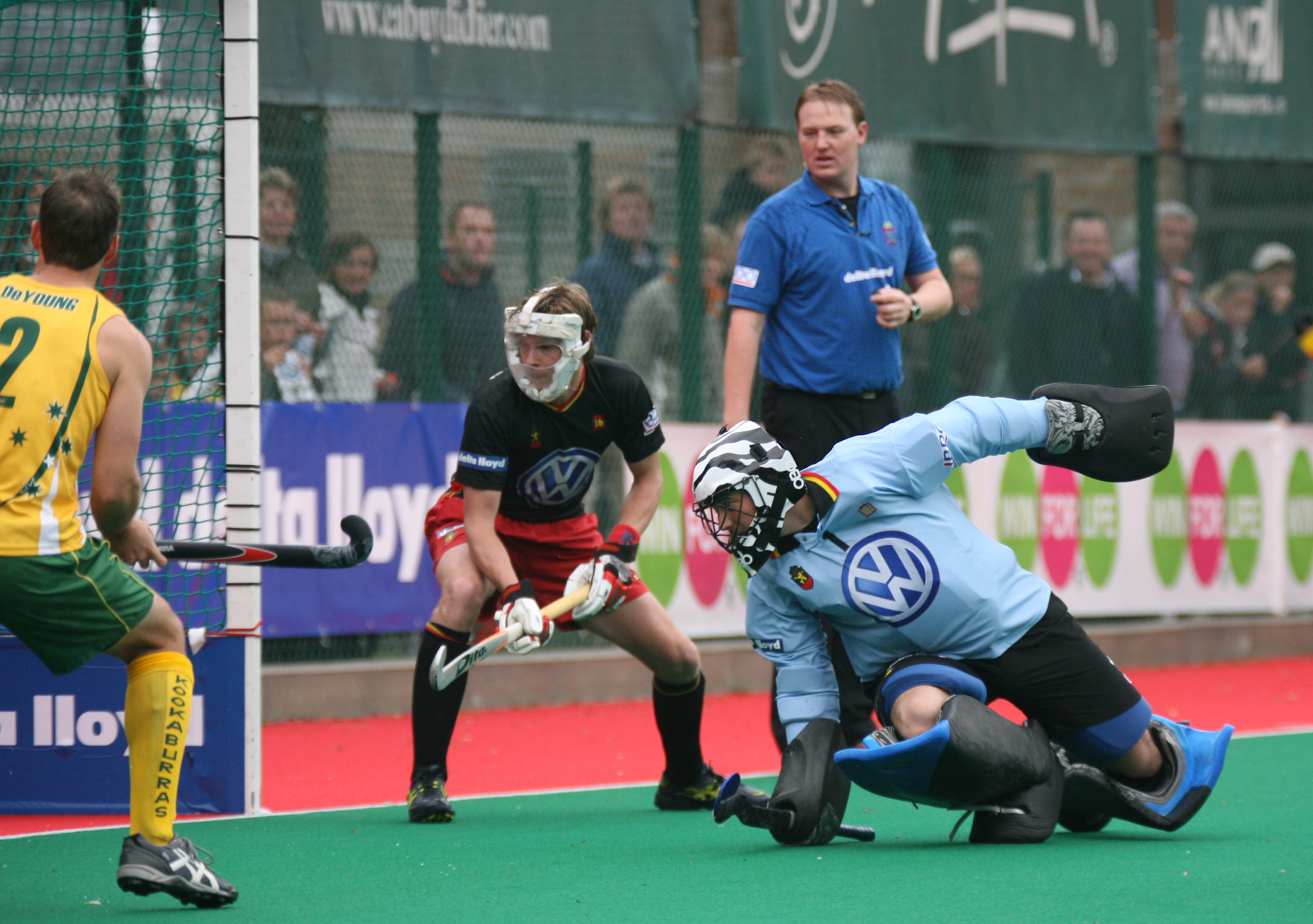
Coen van Bunge during his international debut in Belgium. Photo: Philippe Demaret
Best match: 2019 Spain – France, Olympic qualifiers, Valencia
‘It’s always dangerous to say you whistled well, but those two games were all right. I lived up to those duels for days, knew that with an Olympic ticket for both teams there was an awful lot at stake. Then they can expect me to do everything I can to be fit and good in those matches. I then ask the utmost of myself, I am fully focused. Those kinds of international top matches cannot be compared to, say, Almere against KZ in the big league. Sometimes I am mainly concerned with preventing players from getting into each other’s hair. Internationally, it’s more about managing the game. With Spain against France, for example, I was mainly busy trying to curb the emotions of the Spaniards. ‘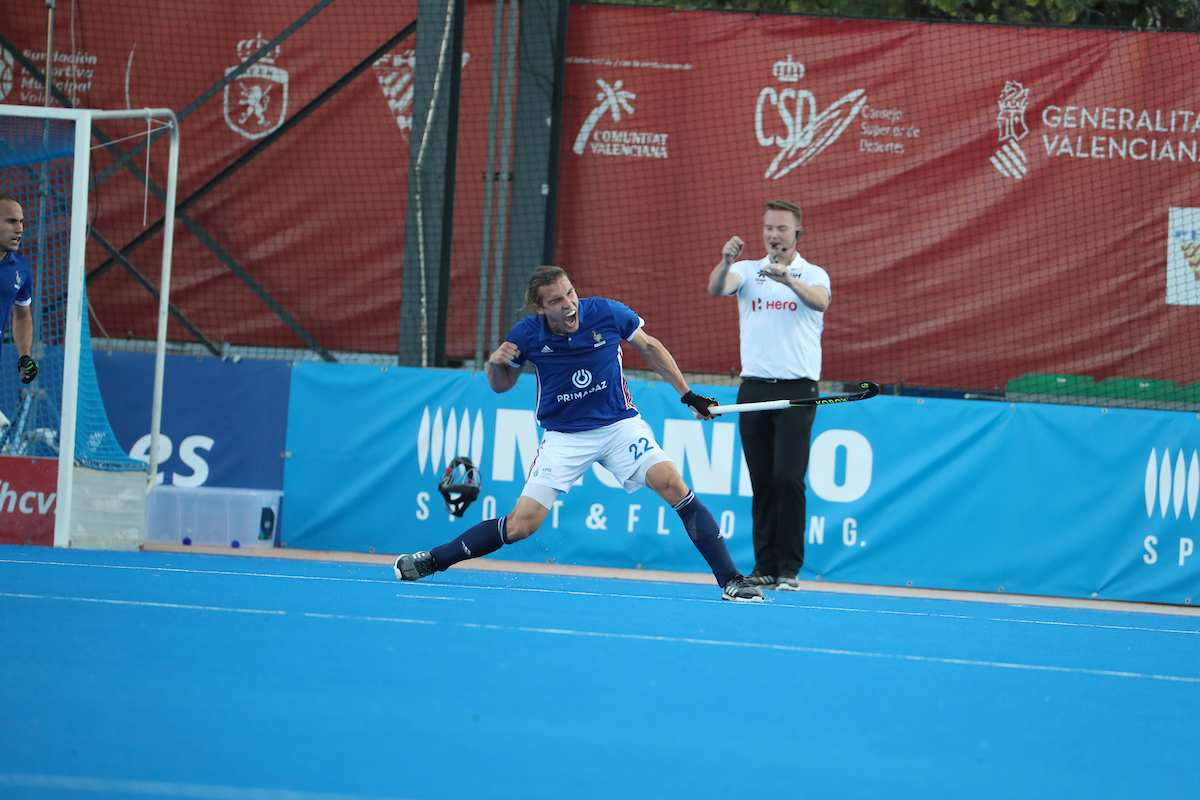
Coen van Bunge approves a goal from France. Photo: FIH
‘Spain and France were very close to each other. The French appeared in both games. But in the end, the Spaniards won. In terms of flutes, I was in a flow, together with my Indian colleague. All decisions were good. No video refferal was requested from me. The players trusted that what I decided was right. That feeling is great for a referee. Afterwards we received compliments from all sides. Also from the French, while it was very sour for them. ‘
Worst Game: 2017 Argentina – Pakistan, HWL, London
‘This game proved that it is not always a joy to whistle. It didn’t go a long way. I was late everywhere, misjudged the situation again and again. It went from bad to really bad. I just wanted one thing: that that match would be over as soon as possible. I actually look back all the international matches that I have called, but I have never seen those images again. It hurts me too much to look at it. ‘
‘I learned that in those difficult moments I have to go back to the basics. Keep it simple. During the game I tried that too, but it was impossible to stop. I had to stick plasters, but at some point the plasters ran out. After that match, I was welcomed by my colleagues. That didn’t help much. I was so angry with myself. I looked up to the next game. At times like that I always call Philip Schellekens, himself a former international and umpires manager. He helped me get back to basics with tips. That went well. Fortunately I didn’t have to whistle that tournament for Pakistan and Argentina anymore. I didn’t want to face it at the time. ‘
Memorable Match (1): 2014 Pakistan – Germany, Champions Trophy Final, Bhubaneswar
Pakistan had reached the final at the expense of India. After that semi-final, the Pakistanis had misbehaved towards the Indian supporters. That turned into quite a riot and resulted in the entire stadium being against Pakistan. Thousands of Indians cheered when Germany had the ball and whistled, shouted and ranted like mad when Pakistan attacked. What a witch’s cauldron that was. The whole game I was mainly busy keeping the players of Pakistan calm. I was lucky that I knew Muhammad Rizwan and Mehmood Rashid from then still Oranje Zwart. Through them I communicated with the Pakistanis. The Germans won. Let me put it this way: that was not unfavorable for the rest afterwards.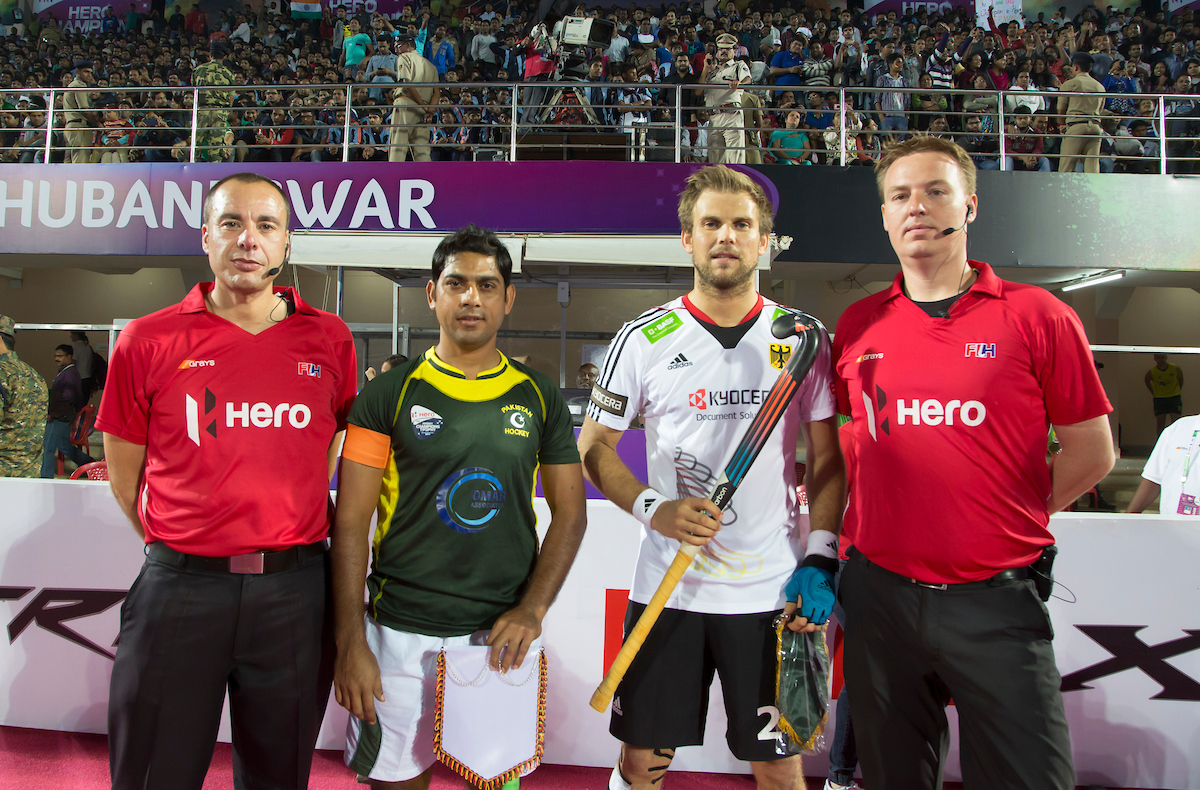
Coen Van Bunge and Paco Vasquez for the Champions Trophy Final in Bhubaneswar. Photo: Koen Suyk
Memorable match (2): 2019 Belgium-Germany, semifinal European Championship, Antwerp
‘The feeling when the stadium in Antwerp exploded at Victor Wegnez’s 3-2 cannot be described. I still get goosebumps when I look back at that goal. I have rarely seen such a release from players and audience. I whistled that match with Jonas van ‘t Hek. Belgium was 2-0 behind. It became 2-1 on my side and then you felt that the game was going to the Belgians. In that match there was also the famous call from Belgium goalkeeper Vincent Vanasch, who saw a German stop the corner by hand. As a referee this is almost impossible to see. Then you can be happy that there is a video. ‘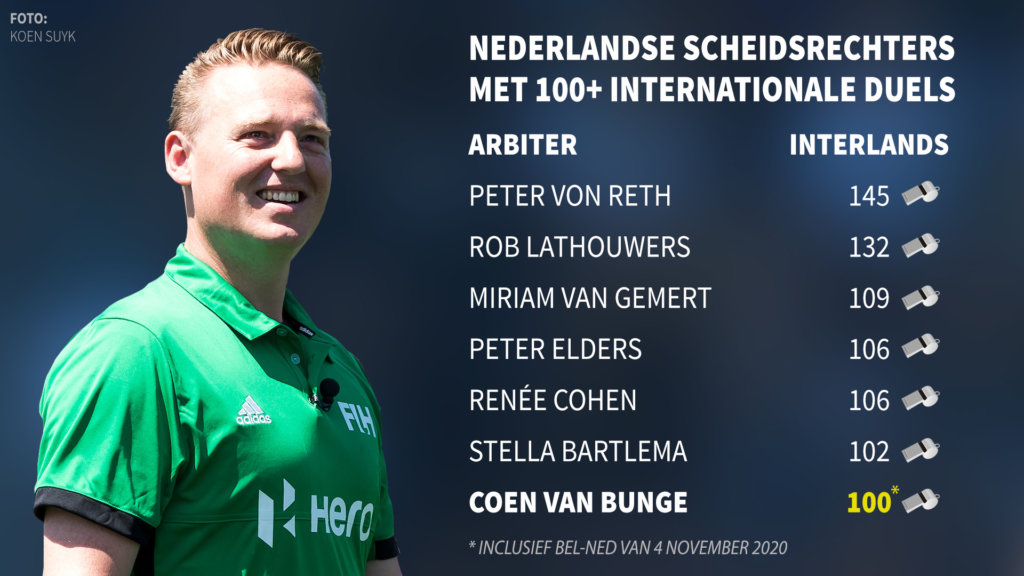
Hundredth game: Belgium – Netherlands, 2020 FIH Pro League, Brussels
‘It was seventeen years ago after Peter Elders that a Dutchman made 100 international matches. That is of course too long a period. I am proud to reach 100. It took me twelve years.
My hundredth is not going to be easy. I already know that. I actually know all the players on the field way too well. Because of the whole situation with corona, I now whistle my home country. I’d rather not do that. I did the same to Great Britain last week. You get strange situations. If only the players keep talking Dutch to me, while I have to answer in English. Together with my Belgian colleague Laurine Delforge, we will nevertheless bring that game to a successful end.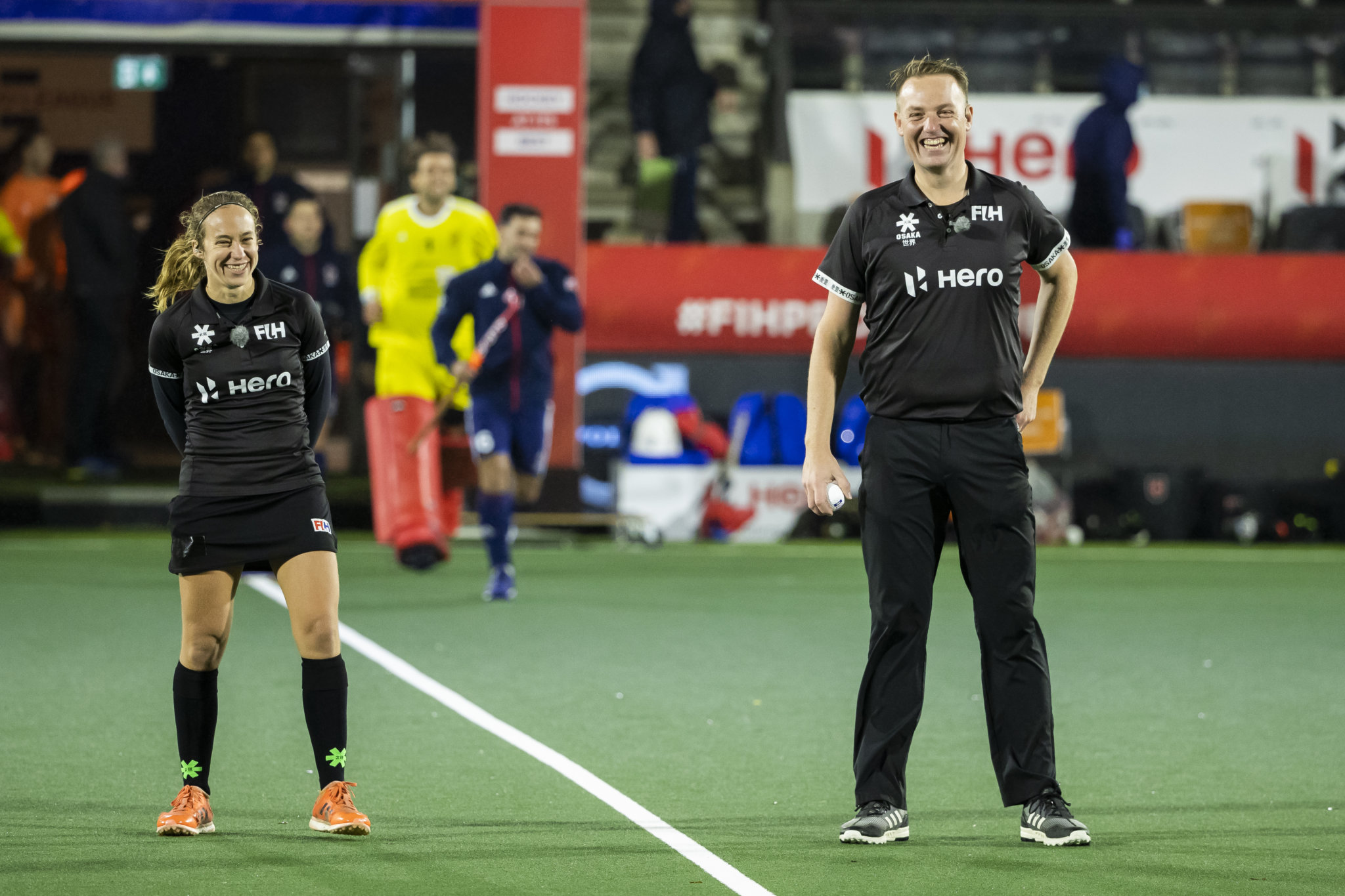
With Laurine Delforge for the Pro League match Netherlands – Great Britain. Photo: Willem Vernes.
‘I am now 39 years old. I don’t think about quitting myself. As long as I like it, I will keep going. I don’t know how many international matches I can still get. Peter von Reth, very respected by me, is a record international with 145 international matches. I would like to succeed him. That should be possible with the competitions to come in the coming years. But I challenge any young referee to break that record quickly. In any case, I hope that it will not be another seventeen years before the next Dutch referee whistles a hundred international matches. ‘
Hockey News World
FIH continues Gender Equality drive with special webinars
Photo credit: Hockey Belgium/PHDPH
Gender equality, indeed equality of any sort, is at the heart of FIH values. But, across our global hockey community, there are inevitably disparities and differences in how far equality has been achieved to this point.
On the one hand, we have mixed umpires operating at the highest level, most recently in the latest FIH Hockey Pro League matches, indicating a complete acceptance that men and women can perform the task equally well. On the other hand, we still have scenarios where there are stark inequalities. These range from inequity when it comes to funding men’s and women’s hockey through to a lack of equal presence on a board or committee.
To address these issues, FIH is launching a National Association Development Series on Gender Equality, starting in mid-November. The series, which is being led by EHF President Marijke Fleuren and Valerie Horyna, will be delivered via webinars and open to representatives from all National Associations.
Both Fleuren and Horyna are leading proponents of gender equality – Fleuren sits on the IOC Women in Sport Commission and both women are key players in the FIH Women in Sport Committee.
The series will be divided into three sessions: an informative introductory webinar that looks at the wider picture. This opening activity will raise awareness of some of the challenges and successes surrounding gender equality in hockey. A wide range of speakers from different backgrounds will offer their perspectives on gender equality.
The introductory session will be followed by five online forums, one for each continental federation. These will examine in more detail some of the challenges and solutions faced by NAs in that region. Keynote speakers, open discussions, looking at case studies and questions and answer sessions will all be used to really delve deep into equality issues.
The concluding session will take the form of a workshop, bringing all elements together. This session is still in the planning stages but the aim is to bring all NAs together to discuss the issues raised and agree ways to move forwards.
Speaking ahead of the opening session, Marijke Fleuren says: “This is such an exciting initiative. Across the continental federations and national associations, there is an open attitude and willingness to ensure gender equality at all levels of the game. But it is a fact of life that some NAs and CFs are further down the line toward achieving equality than others.
“The purpose of the NA Development Series on Gender Equality is to identify areas where improvements can be made, share good practice, discuss issues, highlight where there might be barriers to equality and, through collective willingness and creative thought, arrive at some solutions. I urge all NAs to get involved because hockey is marching onwards when it comes to equality and we want to take everyone with us.”
#EquallyAmazing
FIH site
UNC field hockey's Hendry sets career high in saves in 4-0 ACC Quarterfinals win
By Lindsey Ware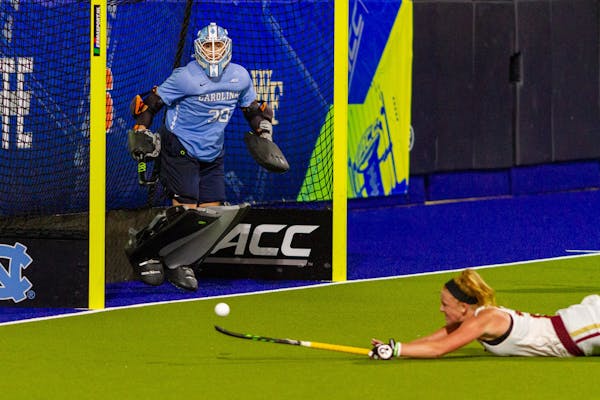
UNC senior goalkeeper Amanda Hendry (30) stands in the goal as Boston College sophomore forward Margo Carlin (24) attempts to save the ball in Karen Shelton Stadium Nov. 5, 2020. The Tar Heels beat the Eagles 4-0 in the first round of the ACC playoffs, securing head coach Karen Shelton’s 700th win. Abe Loven
Amanda Hendry had a big opportunity in the ACC field hockey quarterfinals Thursday night. Facing off against the No. 7 Boston College, the senior goalkeeper started for the No. 2 Tar Heels looking for redemption.
Tensions were high for UNC. Earlier this season, the team suffered a loss to No. 1 Louisville that broke a 47-game win streak — which lasted two-plus seasons and included two national championships. The loss dropped them to the No. 2 seed, resulting in the team having to face off against Boston College at home instead of getting a bye in the first round of the ACC tournament.
“It lit a fire for us,” Hendry said about the loss to Louisville. “It really made us want to fight harder and these past couple of weeks we have. It made us a better team.”
In a 4-0 shutout win for UNC on Thursday night, Hendry saved nine shots, topping her season high of seven in a win against Virginia on Oct. 11. She was the goalkeeper for the entirety of the game against Boston College, contributing greatly to her team’s victory in its first tournament game of the 2020 season.
The Wilton, Connecticut native came out prepared on Thursday afternoon, having started at goalkeeper for the Tar Heels for the past four years and being named to the All-NCAA tournament team for the past two years. Hendry had a successful regular season, with the second highest save percentage of her career at 0.769, and went into the game tied for first in the ACC in total saves with 30.
“It’s nice to be able to help out my team out there,” Hendry said. “My entire team played so great today and helped me make those saves.”
The Tar Heels came into the game as reigning ACC champions three years in a row, and two-time reigning national champions. For seniors like Hendry, this postseason is an opportunity to prove they deserve a spot in the ACC Championship Title game and to leave their North Carolina careers with an ACC Championship for every year of their career.
“We are consistently strong,” head coach Karen Shelton said of her team’s success and the possibility of a fourth consecutive ACC championship title. “We are the most consistently strong team in the nation and I’m proud of that.”
The Tar Heels will play the winner of Thursday night's game between Syracuse and Duke on Friday at 4 p.m. They must secure a win to advance to the ACC championship and fulfill Hendry and her fellow seniors’ hopes of winning a fourth consecutive ACC championship title for their final year on the team.
“Tomorrow, we’re focused on the game and getting a good outcome,” said junior forward Erin Matson, who scored her tenth goal of the season in the game against Boston College.
Hendry said she is also excited for Friday's game, and however many games she has left with the UNC team.
“I’m looking forward to playing with my team some more, however many games we can get,” Hendry said.
The Daily Tar Heel
Karen Shelton ties all-time field hockey win record at 700 after ACC Quarterfinals win
By Ryan Heller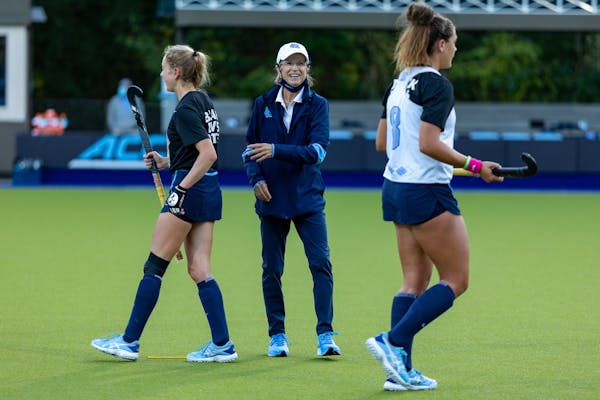
UNC head coach Karen Shelton talks to her players during warmups before UNC plays Boston College in Karen Shelton Stadium Nov. 5, 2020. The Tar Heels beat the Eagles 4-0 in the first round of the ACC playoffs, securing Shelton’s 700th win. Abe Loven
UNC head coach Karen Shelton entered the 2020 season only eight wins away from tying Nancy Stevens at 700 for the most career wins in collegiate field hockey. She needed North Carolina (8-1, 3-1 ACC) to pull out the win against Boston College (0-3, 0-2 ACC) in the ACC Championship Quarterfinals.
And that’s just what the Tar Heels did.
Shelton was supposed to be crowned as field hockey’s winningest coach midway through a pandemic-free regular season. She had a team full of returning talent, led by one of the nation's premiere players with Erin Matson, riding a 47-game win streak.
But a dramatically shortened season and an unexpected defeat gave the 62-year-old head coach a chance to reach the milestone win in the stadium named after her, in a high-stakes conference tournament.
“I told the team that I haven’t played one second of any of those 700, so it was not me that won those games,” Shelton said. “It was all the student athletes that have represented Carolina.”
An already wild season threw another obstacle at the Tar Heels as they faced a Boston College team that had only played two games coming into Thursday's matchup. This made it more difficult for UNC to plan for the game.
“The film this morning was funny because we’ve only had two games to get film on them, so for pregame it was like, ‘We don’t really know what we’re going to do, so let’s just focus on ourselves,’ Matson said. “Luckily, we’re a team that focuses more on what we can do and what our strengths are.
The Eagles were voted by ACC coaches to finish third in the conference coming into the season, but a positive COVID-19 test forced the program to cancel five games, including their Oct. 25 match against North Carolina.
This was nearly the same team that, just one year ago, faced UNC in both the ACC Championship Title game and the NCAA Tournament Semifinals last year, so the Tar Heels were prepared for the fight Boston College gave them.
“They played very well today,” Shelton said. “I thought they fought hard, they threw things at us, they played fast and tough and they gave us all kinds of fits so that was good. It made us better.”
North Carolina started the game strong, forcing four early corners. The constant pressure eventually gave sophomore Paityn Wirth a chance at goal that she capitalized on to give her team an early lead.
The Eagles responded by generating several scoring opportunities, but they could not get the ball past senior goalie Amanda Hendry. The Tar Heels regained control after Wirth tallied her second goal of the game, knocking in a deflected ball.
North Carolina used its strong first half play to cruise the rest of the way to earn Shelton’s historic victory.
The team extended its lead to three when sophomore Madison Orobono notched her first career goal. Matson capped off the game, firing the ball high into the net, for her team-leading 10th goal of the year. When the whistle blew, the team celebrated, knowing what its coach had just achieved.
“Going into the game we all knew about the win,” Matson said. “Obviously she didn’t bring it up because she’s humble and everything. But we were really excited to get that for her.”
While Shelton refused to acknowledge it, focusing on the next match, her players made sure to cheer her on in the post-game huddle.
“She’s one of the best field hockey coaches in the country, if not the best, so I’m really happy for her,” Hendry said.
Shelton now looks to stand alone at the top of the all-time wins leaderboard in Friday’s semifinal match.
“When you have a milestone like this it means I’ve been here a long time,” Shelton said. "But it also gives me an opportunity to thank all the student-athletes that participated in those wins.”
The Daily Tar Heel
Australia set for Olympic hockey ‘Super Camp’
By Rod Gilmour -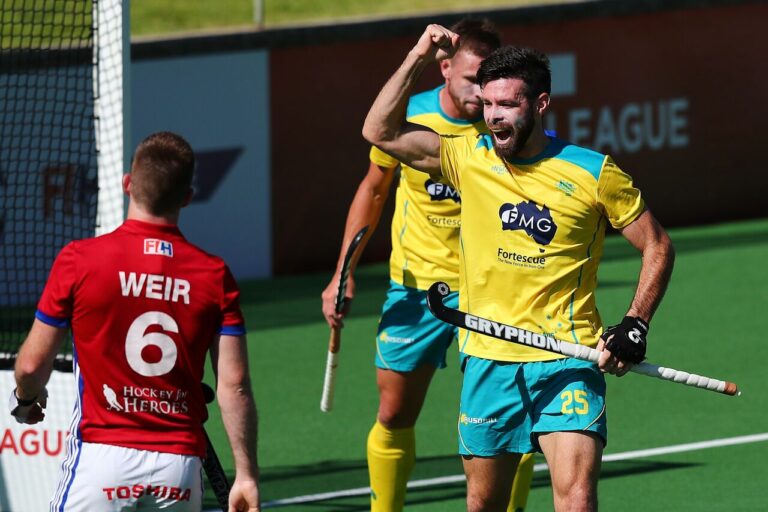
After a year of uncertainty, Kookaburras and Hockeyroos players will aim to cement a guaranteed ticket to Tokyo 2020 over the next 10 days in their own US-style Olympic trials – albeit behind closed doors and without the TV glare.
Billed as a ‘Super Camp’, four intra-squad matches across both squads will replicate the intensity of an international as coaches attempt to whittle down numbers. The camp will largely determine the 16-strong selections for next year’s Olympics.
The selection camp – players have known about the trials for most of the year – is being held due to this year’s FIH Pro League and Sultana Bran Hockey One League competitions being postponed and the unknown of how many fixtures the national sides will be able to play in the run-up to Tokyo.
“We need an opportunity to refresh and reselect the group another year down the track,” said Hockeyroos head coach Paul Gaudoin.
“We are looking for players who perform, make good decisions under pressure and who are buying into the team values and behaviours. All of this will be taken into account.”
https://www.thehockeypaper.co.uk/wp-content/uploads/2019/02/P-SchUAK.jpeg
Meanwhile, Kookaburras coach Colin Batch said: “It allows us to see who has grown during the year, who has developed and who may have stagnated which is why we are using this to select the national squad for next year.”
Three years ago, Great Britain stars were in line to compete for Olympic places in US-style trials after hockey was confirmed as one of the sports in talks to compete in televised events prior to the 2020 Games.
The British Olympic Association was open to the idea of staging multi-sport British trials in a bid to boost popularity and generate television revenue before Olympic Games. But the plans were quietly shelved.
SIGN UP for The Hockey Paper’s returning newsletter: Promotions, exclusives and our best coverage
Punch shots and the ramp: Hockey is losing out to cricket’s magic hands
By Shahbaz M.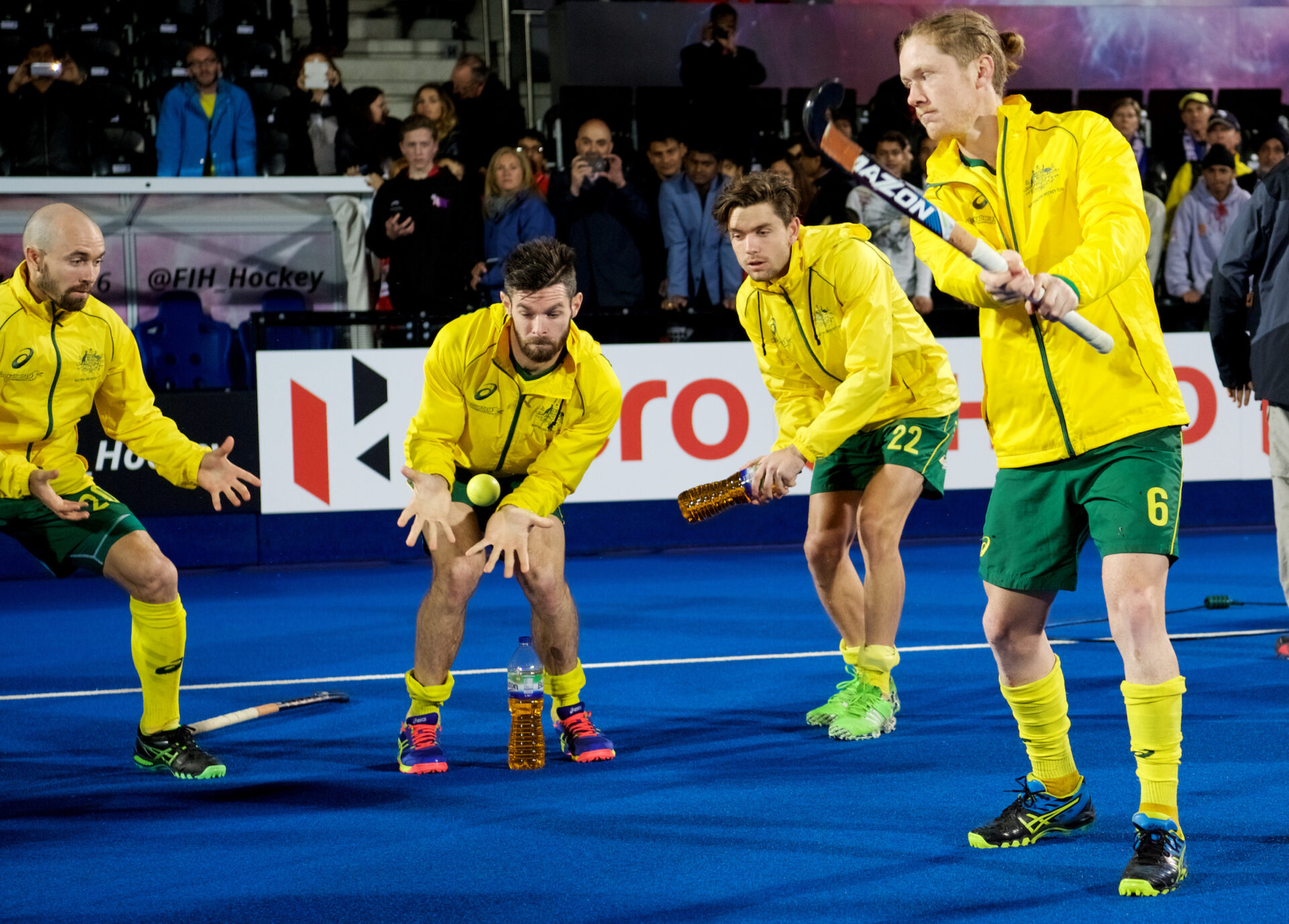
Just before last summer’s Cricket World Cup, Jonny Bairstow used the sport’s showpiece event to pay ode to hockey.
The English opener credited the hours of toil on the hockey pitch in Leeds as a teenager for his effective shot-making on the cricket field.
Here’s what Bairstow, a defender, wrote in The Telegraph: “I owe the power in my shots to my youth playing hockey. I use the same whip action of the wrists to generate energy through the ball. If you watch Jason Roy you will see he has a nice, big flowing follow through on his shots. But I will punch the ball, with very little follow through, a bit like playing a hockey shot with a snap.”
Among a lot of things that have been written and spoken since the tournament began, this bit stood has out for me for the simple reason that hockey often flies under the radar in terms of how much it contributes to other sports philosophically and ideologically.
For instance, in the 2014 FIFA World Cup, Louis van Gaal had two professional hockey players – Hans Jorritsma and Max Reckers as his strategy analysts. It wasn’t the first time Holland’s favourite sport had turned to its second-favourite sport for inspiration. But hockey’s intellectual contribution to other sports is not spoken about much.
So Bairstow’s comments feel like a sentimental tribute to the first coach. Who knows, his words might inspire a school-going kid to pick up a hockey stick!
Bairstow, of course, isn’t the only player who has executed the skills learnt on a hockey field to flourish as a cricketer. Jos Buttler’s signature shot, the ramp, has its origins in hockey as well. The wicketkeeper-batsman was at a local hockey match when he saw a forward trying to deflect a long pass past the goalkeeper by simply putting his stick in the path of the ball.
A former hockey player himself, Buttler was easily able to breakdown the striker’s complex movements, especially changing the angle of the hockey stick at the last second. He fine-tuned the technique and developed it till the time he mastered what later came to be known as the ramp shot.
The slap shot that former India captain MS Dhoni played so masterfully in his prime was inspired from his hockey-playing days on dusty, pebble-laden ground in Ranchi, his hometown in eastern state of Jharkhand. Like most school children, Dhoni grew up playing multiple sports. He excelled as a footballer, was an average cricketer to begin with and was a bits-and-pieces hockey player. What separated him, though, was his ability to borrow the skills learnt in one sport and implementing them while playing another – like the slap shot.
You wonder how things would’ve been if the likes of Bairstow and Dhoni would have gone on to make a career in hockey and not in cricket. Would they have raised the profiles of their respective hockey teams in the same manner? Maybe. Maybe not. It’s unfortunate that gifted players like them, who transcended their sport, did not find it worthy to make a career in hockey.
That leads me to another question, one that I often find myself asking others: Is hockey doing enough to retain talent at a young age? Unfortunately, not enough research has been done on this subject to arrive at a definite conclusion but through first-hand and anecdotal accounts, you get a sense that not enough is being done.
A thesis by The University of Birmingham student Joanna Turnbull on factors that affect talent identification in hockey identifies family, school and clubs as three key influencers. Ms Turnbull’s paper, prepared in 2011, focuses on the English game. If her parameters are applied to rest of the world, few countries come out shining.
All Asian countries fail miserably on all three counts for varying reasons – in India, school-level hockey is virtually dead; in Pakistan the sport itself is on a life support; Malaysia is trying but lacks proper structures which then leads to a mass exodus of players after school level while South Korea seems to have run out of money and patience to revive hockey. None of these countries have a club structure to boast of.
A lot of young children play hockey in South Africa, Australia and England. But they are mostly the ones who attend grammar and state schools and it is one of several sports they play. Playing multiple sports while growing up is indeed beneficial for a child but the general trend is that when it eventually comes to choosing one sport, hockey isn’t always the preferred choice.
Again, the reasons are many – if you’re a South African, ambition/motivation can be a decisive factor since Olympic participation of the hockey team is always a big question mark. A common problem for all hockey-playing nations is the lack of financial security. The amateur nature of the sport – the fact that there are still many players who pay to play – is the biggest deterrent and forces a lot of talented players to migrate to other sports where their future isn’t so uncertain. Ultimately, we are often left with players who stick to the sport only because someone from their family has played it.
That, then, makes me wonder: should hockey aspire to be a big, mass sport – like football, for instance – or is it better off being low-key and family oriented? I know where I stand in this debate, which is also the subject of my next column. Till that appears, I’ll leave you all to ponder over it.
Please help keep independent journalism alive in these uncertain times. With the media industry affected by advertising, we are continuing to offer our coverage free until we return in print.
Ahead of the new season, please subscribe in print or in digital format. Subscriptions for clubs, schools and individuals.
SIGN UP for The Hockey Paper’s returning newsletter: Promotions, exclusives and our best coverage
Hall of Fame - Greg Browning
The youngest player to debut for Australia’s national men’s hockey team, Greg Browning went on to be a key figure for the Kookaburras throughout the 1970’s and early eighties.
Greg Browning was first selected for the Queensland Open Team in 1969 and he continuously represented his state for a period of 15 years until 1983. At the time he was the youngest player ever selected in the Queensland Open Team.
Then at the age of just 16, the young forward became the 217th player capped for Australia as he was thrust into his first international, walking out for the Kookaburras against New Zealand on 19 August 1969 in Melbourne.
He made an immediate impact on the right wing for Australia with his speed and strength on the ball, turning defenders and setting up teammates with perfectly timed passing. It was no surprise when he was selected in the inaugural World Cup team to play in Barcelona in 1971, aged 18.
That was the start of an extended career with the Kookaburras as he was selected for the national team every year until 1982, going on to score 28 goals and make 145 appearances. Given the nickname ‘Sundance’ because of his long, blonde hairstyle, Greg was selected for three Olympics, first in 1972 in Munich, the 1976 Games in Montreal where the team won the silver medal, and also the Moscow Games in 1980 which were boycotted for political reasons.
He attended four World Cups first in 1971 in Barcelona, then 1975 in Kuala Lumpur, 1978 in Buenos Aires where the team won a Bronze Medal and finally in 1982 in Bombay (a Bronze Medal). He also attended 3 Championship Trophies in 1978 Lahore (Silver Medal), 1980 Kuala Lumpur (Bronze Medal) and Amsterdam (Silver Medal).
Greg retired after the Olympic boycott but Australian Coach at the time, Richard Aggiss enticed him from retirement to play in the World Cup in Bombay in December 1981 and the Champions Trophy in Amsterdam in 1982 before Greg announced his retirement ending an illustrious hockey career. Greg has remained involved in Hockey, coaching at all levels in his home state of Queensland, including leading Queensland to numerous Australian Hockey League titles.
Greg was awarded Queensland’s Hockey Association Award of Merit in 1995 before being inducted into Hockey Queensland’s Hall of Fame in 2002. His career was further recognised with a Distinguished Player Award when initiated in 2008, and he was also named in Queensland’s Team of the Century in 2008.
Greg also served as a selector for the Kookaburras from 1989 to 1995. Greg’s induction into the Hockey Australia Hall of Fame was ratified in 2016.
What he said…
“Thanks to Hockey Australia and everyone who supported and coached me during my playing career. To be selected for the Kookaburras was something I always aspired to as a young hockey player, and it is an honour to be inducted into the Hall of Fame.” Greg Browning
From those in the know…
“Greg Browning was the youngest player to play for Australia when he was first selected as a 16 year old in 1969. At that time he was seen to have great natural ability and potential to be an outstanding International hockey player. Playing in the forward line, Greg was a wonderful athlete, with blistering speed and balance, wonderful elimination skills and a strength and determination in the circle that made him a potent scoring weapon. He became one of Australia’s best forwards in a very successful era, not only as a striker but also across the midfield. As testament to his importance in the playing group, after he retired from international hockey at a relatively young age of 27, he was convinced to make himself available for two more very important competitions, including the 1981 World Cup.
Greg’s interest and enthusiasm for the game continued after international playing retirement with his involvement as a coach at club and state level. He was appointed as an Australian Selector from 1989 to 1997 when he became the NTC Coach in Queensland. A position he held through until 2009, at which time he concluded 40 years in the elite level of Hockey in Australia. A truly great player and servant of the game.” John McKinnon (Australian selector and Hall of Fame Committee Member)
Hockey Timeline
Player
1971 World Cup Barcelona
1975 World Cup in Kuala Lumpur
1978 World Cup in Buenos Aries (Bronze Medal)
1982 World Cup in Bombay (Bronze Medal)
1978 Champions Trophy in Lahore (Silver Medal)
1980 Champions Trophy in Kuala Lumpur (Bronze Medal)
1982 Champions Trophy in Amsterdam (Silver Medal)
Hockey Australia media release
MHC give RM10,000 assistance to each affiliate
By Jugjet Singh
KUALA LUMPUR: The Malaysian Hockey Confederation (MHC) handed out an administrative grant of RM10,000 to each state affiliate, as well as Police and Armed Forces, yesterday.
It is an initiative to help their affiliates cushion the impact of the Covid-19 pandemic.
MHC president Datuk Seri Subahan Kamal hopes this will help to ease the administrative load on their affiliates.
"Although our 14 affiliates are unable to organise tournaments now, we felt it was only proper to assist them.
"We are looking into other ways to help affiliates, coaches and players affected by the pandemic.
"The confederation also hope to increase their grant allocation in the future.
"Our sponsorship committee are working hard to bring in more deals next year," said Subahan.
New Straits Times
Megat fights against 18-month ban
By Jugjet Singh
Hockademy owner Datuk Seri Megat D. Shahriman (centre) with his lawyer Zhafri Aminurashid (left) at a press conference yesterday.
A DEFIANT Datuk Seri Megat D. Shahriman is prepared to fight his 18-month ban by the Malaysian Hockey Confederation (MHC) all the way.
This means the Kuala Lumpur Hockey Association (KLHA) president would not hesitate to drag the MHC to the Court of Arbitration for Sports (CAS) in Lausanne, Switzerland and the world hockey federation (FIH).
Megat said yesterday he will use all available means to fight the ban imposed on him by the MHC on Tuesday.
He was found guilty by the MHC Disciplinary Board of breaking the Malaysia Hockey League (MHL) code of conduct.
However, Megat contended there were many flaws in the board's decision and if necessary, he will seek redress with the world sports court or the FIH.
"I was banned for 18 months by the MHC on Nov 4 because I questioned the prize money payout for the MHL and supposedly went against the tournament code of conduct," he said.
"I take notice of the decision and I am ready to defend my decision to demand payment of the MHL prize money as it is my duty as the owner of HockAdemy.
"I will use all the procedures and the channels provided in the MHC constitution and I will also not hesitate to take the matter to the FIH or even the Sports Arbitration Court.
"This is because the punishment and disciplinary procedures used against me are very strange and there are many questions arising from it.
"One is that the MHL tournament code of conduct states that any disciplinary action taken after the end of the tournament must be initiated by the secretary general while MHC's constitution does not have a provision of a secretary general by clear definition.
"MHL code of conduct also states that one is only guilty of misconduct if there is a personal attack in a media statement but I was only questioning the late payment of the MHL prize money as my two official letters to MHC did not receive any reply."
Megat was hauled up by the DB because he wrote to the MHL sponsors: TNB, QNet and Bank Islam, enquiring the status of the sponsorship money and he also went to the press prior to writing to MHC for clarification.
New Straits Times
Tribute to Tony Godding
By Gordon Pentecost and Warren Boden
It is with great sadness that the hockey fraternity learnt on Tuesday morning of the passing of Tony Godding.
Tony, affectionally known to all as Godders, loved hockey and made a huge contribution in so many spheres of the game.
He represented Border at provincial level and once he retired, he then immersed himself in all facets of the game.
He served as convenor of the National Men’s Selection Panel, National Men’s Under 21 Selection Panel and South African Schools Selection Panel. He was appointed Coach of the National Men’s Team and the National Under 21 Men’s team.
He also served on the South African Hockey Association Executive.
In his later years he devoted his time to school’s hockey in various capacities for Border Schools and then in particular for Selborne College. His coaching, knowledge and ability to understand and motivate young hockey players, had a massive impact on legions of Selborne Boys College players. His contribution to Selborne helped the school establish its reputation as one of the leading hockey playing schools in South Africa and the annual Selborne Hockey Festival was named “The Tony Godding Hockey Festival” in his honour- an accolade he so richly deserved.
He was an amazingly knowledgeable hockey man, who showed insight, wisdom and empathy with all the men who played in the teams he coached. Godders was a hockey encyclopaedia, who could remember hockey scores of most hockey world cup finals at the drop of a hat.
So, dedicated and committed was he that on the eve of a test match he had to settle his nerves with a Radox bath and several liquid tranquilizers. His pre-match talks were legendary as in those days there were no PowerPoint facilities or smart boards and they usually consisted of bottle tops being moved around the table with a trembling hand, but the message and tactics always hit the mark.
We had the privilege of serving on selection panels with Tony and being such a highly principled man, he made sure that every single player was considered thoroughly, before the final selection was made. His integrity was never questioned amongst coaches and players.
His contribution to Border hockey was immense, where his energy, administration, coaching and mentoring skills for more than 60 years was legendary and beyond equal.
I valued his wisdom and his friendship immensely and, on many occasions, when faced with a hockey related problem, I had no hesitation in phoning Tony, where he would listen carefully to the problem and then give me such wise council.
Tony was a legend in South African Hockey and the tributes which have poured in from hockey players throughout the country and abroad, bears testimony to the respect and love that they had for him.
He will be sorely missed but his memory will last forever.
SA Hockey Association media release
Hockey great Rasheed Junior is no more
Mohammad Yaqoob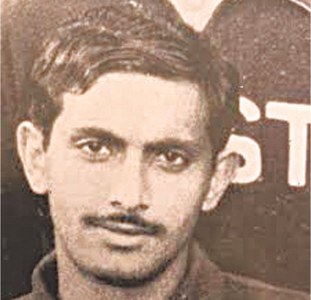
LAHORE: Pakistan hockey suffered a huge loss with the passing away of former national captain and hockey legend Abdul Rasheed Junior in Islamabad after a brief illness at the age of 79.
The former Olympian — regarded as one of the finest centre-forwards the country ever produced — was a gifted spearhead who held many records in the days when Pakistan were a real force in hockey at the international level.
Rasheed represented Pakistan at three Olympic Games. He was part of 1968 gold medal-winning squad as well as a member of the 1972 silver medal-winning team and the 1976 bronze medal winning side.
A humble and down to earth individual, Rasheed had the unique distinction of being the top scorer at the 1968 and 1972 Olympics. He also represented the country in the 1971 World Cup. At the time of his retirement from international hockey he emerged as Pakistan’s highest goal-scorer with 96 goals.
Rasheed was the younger brother of four-time Olympian retired Brig Abdul Hamid Hamidi, who died last year and served as director general of Pakistan Sports Board as well as secretary PHF.
Meanwhile, the Pakistan Hockey Federation (PHF) and the Pakistan Olympic Association (POA) condoled the sad demise of Rasheed Jr.
In a condolence message, PHF president retired Brig Khalid Sajjad Khokhar paid rich tribute to Rasheed and his services for the sport.
It may be mentioned here that neither the PHF nor the government took care of him when he was in hospital.
Meanwhile, POA president retired Lt Gen Syed Arif Hasan prayed to Almighty Allah to rest the departed soul in eternal peace.
Rasheed Jr’s Namaz-i-Janazah was offered at the Bannu Tarang Cemetery on Wednesday afternoon and he was laid to rest in his native village graveyard.
Dawn
